- Home
- Kahlil Gibran
The Kahlil Gibran Collection Page 4
The Kahlil Gibran Collection Read online
Page 4
Part Three
On the north side of that village, in the midst of the wind-torn fields, stood the solitary home of a woman named Rachel, and her daughter Miriam who had not then attained the age of eighteen. Rachel was the widow of Samaan Ramy, who was found slain six years earlier, but the law of man did not find the murderer.
Like the rest of the Lebanese widows, Rachel sustained life through long, hard work. During the harvest season, she would look for ears of corn left behind by others in the field, and in Autumn she gathered the remnants of some forgotten fruits in the gardens. In Winter she spun wool and made raiment for which she received a few piastres or a bushel of grain. Miriam, her daughter, was a beautiful girl who shared with her mother the burden of toil.
That bitter night the two women were sitting by the fireplace whose warmth was weakened by the frost and whose firebrands were buried beneath the ashes. By their side was a flickering lamp that sent its yellow, dimmed rays into the heart of darkness like a prayer that sends phantoms of hope into the hearts of the sorrowful.
Midnight had come and they were listening to the wailing winds outside. Every now and then Miriam would get up, open the small transom and look toward the obscured sky, and then she would return to her chair worried and frightened by the raging elements. Suddenly Miriam started, as if she had awakened from a swoon of deep slumber. She looked anxiously toward her mother and said, "Did you hear that, Mother? Did you hear a voice calling for help?" The mother listened a moment and said, "I hear nothing but the crying wind, my daughter." Then Miriam exclaimed, "I heard a voice deeper than the thundering heaven and more sorrowful than the wailing of the tempest."
Having uttered these words. she stood up and opened the door and listened for a moment. Then she said, "I hear it again, Mother!" Rachel hurried toward the frail door and after a moment's hesitation she said, "And I hear it, too. Let us go and see."
She wrapped herself with a long robe, opened the door and walked out cautiously, while Miriam stood at the door, the wind blowing her long hair.
Having forced her way a short distance through the snow, Rachel stopped and shouted out, "Who is calling . where are you?" There was no answer; then she repeated the same words again and again, but she heard naught except thunder. Then she courageously advanced forward, looking in every direction. She had walked for some time, when she found some deep footprints upon the snow; she followed them fearfullly and in a few moments found a human body lying before her on the snow, like a patch on a white dress. As she appraoched him and leaned his head over her knees, she felt his pulse that bespoke his slowing heart beats and his slim chance in life. She turned her face toward the hut and called, "Come, Miriam, come and help me, I have found him!" Miriam rushed out and followed her mother's footprints, while shivering with cold and trembling with fear. As she reached the place and saw the youth lying motionless, she cried with an aching voice. The mother put her hands under his armpits, calmed Miriam and said, "Fear not, for he is still living; hold the lower edge of his cloak and let us carry him home."
Confronted with the strong wind and heavy snow, the two women carried the youth and started toward the hut. As they reached the little haven, they laid him down by the fireplace. Rachel coomenced rubbing his numbed hands and Miriam drying his hair with the end of her dress. The youth began to move after a few minutes. His eyelids quivered and he took a deep sigh -- a sigh that brought the hope of his safety into the hearts of the merciful women. They removed his shoes and took off his black robe. Miriam looked at her mother and said, "Observe his raiment, Mother; these clothes are worn by the monks." After feeding the fire with a bundle of dry sticks, Rachel looked at her daughter with perplexity and said, "The monks do not leave their convent on such a terrible night." And Miriam inquired, "But he has no hair on his face; the monks wear beards." The mother gazed at him with eyes full of mercy and maternal love; then she turned to her daughter and said, "It makes no difference whether he is a monk or a criminal; dry his feet well, my daughter." Rachel opened a closet, took from it a jar of wine and poured some in an earthenware bowl. Miriam held his head while the mother gave him some of it to stimulate his heart. As he sipped the wine he opened his eyes for the first time and gave his rescuers a sorrowful look mingled with tears of gratitude -- the look of a human who felt the smooth touch of life after having been gripped in the sharp claws of death -- a look of great hope after hope had died. Then he bent his head, and his lips trembled when he uttered the words, "May God bless both of you." Rachel placed her hand upon his shoulder and said, "Be calm, brother. Do not tire yourself with talking until you gain strength." And Miriam added, "Rest your head on this pillow, brother, and we will place you closer to the fire." Rachel refilled the bowl with wine and gave it to him. She looked at her daughter and said, "Hang his robe by the fire so it will dry." Having executed her mother's command, she returned and commenced looking at him mercifully, as if she wanted to help him by pouring into his heart all the warmth of her soul. Rachel brought two loaves of bread with some preserves and dry fruits; she sat by him and began to feed him small morsels, as a mother feeds her little child. At this time he felt stronger and sat up on the hearth mat while the red flames of fire reflected upon his sad face. His eyes brightened and he shook his head slowly, saying, "Mercy and cruelty are both wrestling in the human heart like the mad elements in the sky of this terrible night, but mercy shall overcome cruelty because it is divine, and the terror alone, of this night, shall pass away when daylight comes." Silence prevailed for a minute and then he added with a whispering voice, "A human hand drove me into desperation and a human hand rescued me; how severe man is, and how merciful man is!" And Rachel inquired, "How ventured you, brother, to leave the convent on such a terrible night, when even the beasts do not venture forth?"
The youth shut his eyes as if he wanted to restore his tears back into the depths of his heart, whence they came, and he said, "The animals have their caves, and the birds of the sky their nests, but the son of man has not place to resthis head." Rachel retorted, "That is what Jesus said about himself." And the young man resumed, "This is the answer for every man who wants to follow the Spirit and the Truth in this age of falsehood, hypocrisy and corruption."
After a few moments of contemplation, Rachel said, "But there are many comfortable rooms in the convent, and the coffers are full of gold, and all kinds of provisions. The sheds of the convent are stocked with fat calves and sheep; what made you leave such haven in this deathly night?" The youth sighed deeply and said, "I left that place because I hated it." And Rachel rejoined, "A monk in a convent is like a soldier in the battlefield who is required to obey the orders of his leader regardless of their nature. I heard that a man could not become a monk unless he did away with his will, his thoughts, his desires, and all that pertains to the mind. But a good priest does not ask his monks to do unreasonable things. How could the head priest of Deir Kizhaya ask you to give up your life to the storms and snow?" And he remarked, "In the opinion of the head priest, a man cannot become a monk unless he is blind and ignorant, senseless and dumb. I left the convent because I ama sensible man who can see, feel, and hear."
Miriam and Rachel stared at him as if they had found in his face a hidden secret; after a moment ofmeditation the mother said, "Will a man who sees and hears go out on a night that blinds the eyes and deafens the ears?" And the youth sated quietly, "I was expelled from the convent." "Expelled!" exclaimed Rachel; and Miriam repeated the same word in unison with her mother.
He lifted his head, regretting his words, for he was afraid lest their love and sympathy be converted into hatred and disrespect; but when he looked at them and found the rays of mercy still emanating from their eyes, and their bodies vibrating with anxiety to learn further, his voice choked and he continued, "Yes, I was expelled form the convent because I could not dig my grave with my own hands, and my heart grew weary of lying and pilfering. I was expelled form the convent because my soul refused to enjoy the bounty of a p
eople who surrendered themselves to ignorance. I was driven away because I could not find rest in the comfortable rooms, built with the money of the poor fellahin. My stomach could not hold bread baked with the tears of the orphans. My lips could not utter prayers sold for gold and food by the heads to the simple and faithful people. I was expelled from the convent like a filthy leper because I was repeating to the monks the rules that qualified them to their present position."
Silence prevailed while Rachel and Miriam were contemplating his words and gazing at him, when they asked, "Are your father and mother living?" And he responded, "I have no father or mother now a place that is my home." Rachel drew a deep sigh and Miriam turned her face toward the wall to hide hr merciful and loving tears.
As a withering flower is brought back to life by dew drops that dawn pours into its begging petals, so the youth's anxious heart was enlivened by his benefactor's affection and kindness. He looked at them as a soldier looks upon his liberators who rescue him from the grip of the enemy, and he resumed, "I lost my parents before I reached the age of seven. The village priest took me to Deir Kizhaya and left me at the disposal of the monks who were happy to take me in and put me in charge of the cows and sheep, which I led each day to the pasture. When I attained the age of fifteen, they put on me this black robe and led me into the altar whereupon the head priest addressed me saying, 'Swear by the name of God and all saints, and make a vow to live a virtuous life of poverty and obedience.' I repeated the words before I realized their significance or comprehended his own interpretation of poverty, virtue and obedience.
"My name was Khalil, and since that time the monks addressed me as Brother Mobarak, but they never did treat me as a brother. They ate the most palatable foods and drank the finest wine, while I lived on dry vegetables and water, mixed with tears. They slumbered in soft beds while I slept on a stone slab in a dark and cold room by the shed. Oftentimes I asked myself, 'When will my heart stop craving for the food they eat and the wine they eat? When will I cease to tremble with fear before my superiors?' But all my hopes were in vain, for I was kept in the same state; and in addition to caring for the cattle, I was obliged to move heavy stones on my shoulders and to dig pits and ditches. I sustained life on a few morsels of bread given to me in reward for my toil. I knew of no other place to which I might go, and the clergymen at the convent had caused me to abhor everything they were doing. They had poisoned my mind until I commenced to think that the whole world was an ocean of sorrows and miseries and that the convent was the only port of salvation. But when I discovered the source of their food and gold, I was happy that I did not share it."
Khalil straightened himself and looked about with wonder, as if he had found something beautiful standing before him in that wretched hut. Rachel and Miriam remained silent and he proceeded, "God, who took my father and exiled me as an orphan to the convent, did not want me to spend all my life walking blindly toward a dangerous jungle; nor did He wish me to be a miserable slave for the rest of my life. God opened my eyes and ears and showed me the bright light and made me hear Truth when Truth was talking."
Rachel thought aloud, "Is there any light, other than the sun, that shines over all the people? Are human beings capable of understanding the Truth?" Khalil returned, "The true light is that which emanates from within man, and reveals the secrets of the heart to the soul, making it happy and contented with life. Truth is like the stars; it does not appear except from behind obscurity of the night. Truth is like all beautiful things in the world; it does not disclose its desirability except to those who first feel the influence of falsehood. Truth is a deep kindness that teaches us to be content in our everyday life and share with the people the same happiness."
Rachel rejoined, "Many are those who live according to their goodness, and many are those who believe that compassion to others is the shadow of the law of God to man; but still, they do not rejoice in life, for they remain miserable until death." Khalil replied, "Vain are the beliefs and teachings that make man miserable, and false is the goodness that leads him into sorrow and despair, for it is man's purpose to be happy on this earth and lead the way to felicity and preach its gospel wherever he goes. He who does not see the kingdom of heaven in this life will never see it in the coming life. We came not into this life by exile, but we came as innocent creatures of God, to learn how to worship the holy and eternal spirit and seek the hidden secrets within ourselves from the beauty of life. This is the truth which I have learned from the teachings of the Nazarene. This is the light that came from within me and showed me the dark corners of the convent that threatened my life. This is the deep secret which the beautiful valleys and fields revealed to me when I was hungry, sitting lonely and weeping under the shadow of the trees.
Broken Wings (1912 )
Foreword
I was eighteen years of age when love opened my eyes with its magic rays and touched my spirit for the first time with its fiery fingers, and Selma Karamy was the first woman who awakened my spirit with her beauty and led me into the garden of high affection, where days pass like dreams and nights like weddings.
Selma Karamy was the one who taught me to worship beauty by the example of her own beauty and revealed to me the secret of love by her affection; se was the one who first sang to me the poetry of real life.
A very young man remembers his first love and tries to recapture that strange hour, the memory of which changes his deepest feeling and makes him so happy in spite of all the bitterness of its mystery.
In every young man's life there is a "Selma" who appears to him suddenly while in the spring of life and transforms his solitude into happy moments and fills the silence of his nights with music.
I was deeply engrossed in thought and contemplation and seeking to understand the meaning of nature and the revelation of books and scriptures when I heard LOVE whispered into my ears through Selma's lips. My life was a coma, empty like that of Adam's in Paradise, when I saw Selma standing before me like a column of light. She was the Eve of my heart who filled it with secrets and wonders and made me understand the meaning of life.
The first Eve led Adam out of Paradise by her own will, while Selma made me enter willingly into the paradise of pure love and virtue by her sweetness and love; but what happened to the first man also happened to me, and the fiery word which chased Adam out of Paradise was like the one which frightened me by its glittering edge and forced me away from paradise of my love without having disobeyed any order or tasted the fruit of the forbidden tree.
Today, after many years have passed, I have nothing left out of that beautiful dream except painful memories flapping like invisible wings around me, filling the depths of my heart with sorrow, and bringing tears to my eyes; and my beloved, beautiful Selma, is dead and nothing is left to commemorate her except my broken heart and tomb surrounded by cypress trees. That tomb and this heart are all that is left to bear witness of Selma.
The silence that guards the tomb does not reveal God's secret in the obscurity of the coffin, and the rustling of the branches whose roots suck the body's elements do not tell the mysteries of the grave, by the agonized sighs of my heart announce to the living the drama which love, beauty, and death have performed.
Oh, friends of my youth who are scattered in the city of Beirut, when you pass by the cemetery near the pine forest, enter it silently and walk slowly so the tramping of your feet will not disturb the slumber of the dead, and stop humbly by Selma's tomb and greet the earth that encloses her corpse and mention my name with deep sigh and say to yourself, "here, all the hopes of Gibran, who is living as prisoner of love beyond the seas, were buried. On this spot he lost his happiness, drained his tears, and forgot his smile."
Ay that tomb grows Gibran's sorrow together with the cypress trees, and above the tomb his spirit flickers every night commemorating Selma, joining the branches of the trees in sorrowful wailing, mourning and lamenting the going of Selma, who, yesterday was a beautiful tune on the lips of life and today
is a silent secret in the bosom of the earth.
Oh, comrades of my youth! I appeal to you in the names of those virgins whom your hearts have loved, to lay a wreath of flowers on the forsaken tomb of my beloved, for the flowers you lay on Selma's tomb are like falling drops of dew for the eyes of dawn on the leaves of withering rose.
Silent Sorrow
My neighbors, you remember the dawn of youth with pleasure and regret its passing; but I remember it like a prisoner who recalls the bars and shackles of his jail. You speak of those years between infancy and youth as a golden era free from confinement and cares, but I call those years an era of silent sorrow which dropped as a seed into my heart and grew with it and could find no outlet to the world of Knowledge and wisdom until love came and opened the heart's doors and lighted its corners. Love provided me with a tongue and tears. You people remember the gardens and orchids and the meeting places and street corners that witnessed your games and heard your innocent whispering; and I remember, too, the beautiful spot in North Lebanon. Every time I close my eyes I see those valleys full of magic and dignity and those mountains covered with glory and greatness trying to reach the sky. Every time I shut my ears to the clamor of the city I hear the murmur of the rivulets and the rustling of the branches. All those beauties which I speak of now and which I long to see, as a child longs for his mother's breast, wounded my spirit, imprisoned in the darkness of youth, as a falcon suffers in its cage when it sees a flock of birds flying freely in the spacious sky. Those valleys and hills fired my imagination, but bitter thoughts wove round my heart a net of hopelessness.

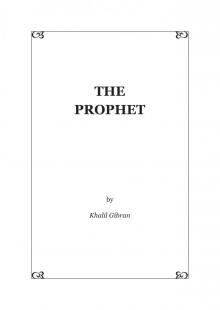 The Prophet
The Prophet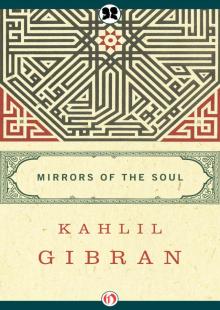 Mirrors of the Soul
Mirrors of the Soul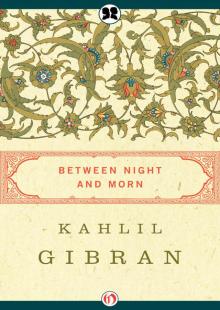 Between Night and Morn
Between Night and Morn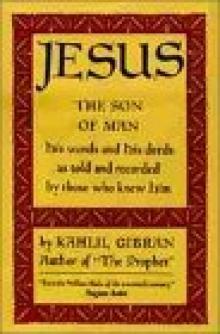 Jesus the Son of Man
Jesus the Son of Man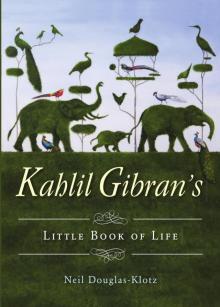 The Little Book of Life's Wisdom
The Little Book of Life's Wisdom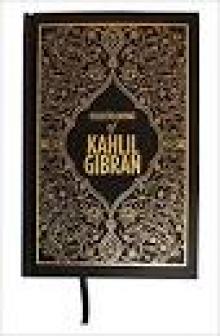 The Kahlil Gibran Collection
The Kahlil Gibran Collection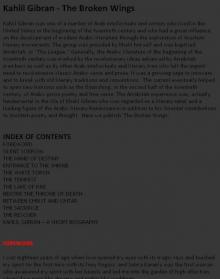 The Broken Wings
The Broken Wings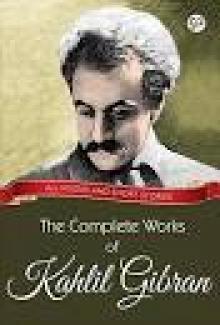 Collected Poetical Works of Kahlil Gibran
Collected Poetical Works of Kahlil Gibran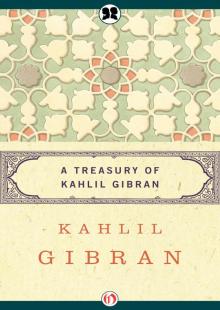 The Treasured Writings of Kahlil Gibran
The Treasured Writings of Kahlil Gibran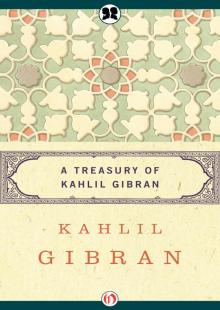 Treasury of Kahlil Gibran
Treasury of Kahlil Gibran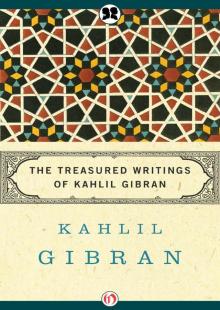 Treasured Writings of Kahlil Gibran
Treasured Writings of Kahlil Gibran